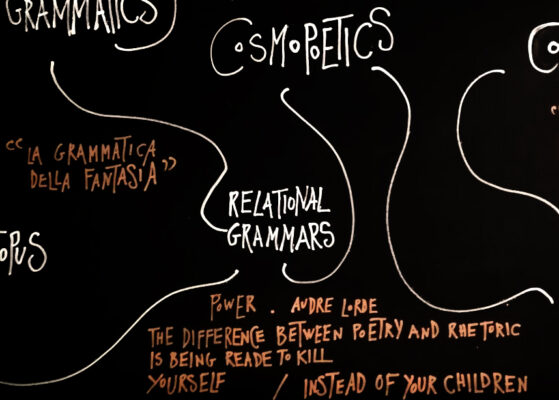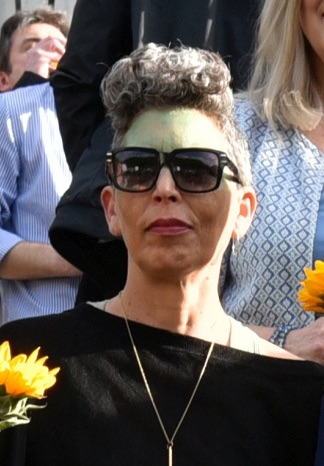Search
To search for an exact match, type the word or phrase you want in quotation marks.
A*DESK has been offering since 2002 contents about criticism and contemporary art. A*DESK has become consolidated thanks to all those who have believed in the project, all those who have followed us, debating, participating and collaborating. Many people have collaborated with A*DESK, and continue to do so. Their efforts, knowledge and belief in the project are what make it grow internationally. At A*DESK we have also generated work for over one hundred professionals in culture, from small collaborations with reviews and classes, to more prolonged and intense collaborations.
At A*DESK we believe in the need for free and universal access to culture and knowledge. We want to carry on being independent, remaining open to more ideas and opinions. If you believe in A*DESK, we need your backing to be able to continue. You can now participate in the project by supporting it. You can choose how much you want to contribute to the project.
You can decide how much you want to bring to the project.

To introduce the conversations with three collectives in relation to the conceptual map “Poetic Recodification Of Collective Imagination”, I wrote a text proposing the construction of a horizon of hope that could overcome colonial, racist, patriarchal and neoliberal power. After these last few weeks, it certainly seems a naïve and useless proposal. In the last few days I am unable to find the emotional and political vocabulary to write this text. The words are wrong, vague and superfluous in the face of the Palestinian genocide [1]Raz Segal, A Textbook Case of Genocide. Jewish Currents, October 13, 2023 after 75 years of colonisation and the mass murder and kidnapping of Israeli civilians. With horror in my body I hold on even tighter to the idea of imagining a horizon of hope that a different world is possible. I refuse to accept the world I live in without resistance. As fragile as my voice is and as weak as my actions are, I must articulate that resistance and my field of action to do so is art and writing.
Imagination as the very essence of being human is hijacked by ideologies, media and social polarisation. If we lose the capacity to imagine a different world, we are dead as a species. Of course, the construction of a horizon of hope depends significantly on one’s power, privilege and/or capacity. Without minimal individual life-sustaining conditions, hope is an empty concept. A community is necessary for individual life-sustaining conditions to be possible. Without a community that makes the materiality of life possible, it is not possible to give meaning to the idea of hope.
“Poetic Recodification Of Collective Imagination” wants to address this essential concern: how can we imagine forms of collectivity that sustain life and allow us to recode our imagination in the construction of a horizon of hope? Of course the map is not the answer. The answer is each of the processes carried out by a group of people who decide to share the responsibility of sustaining their life in common and, through which, to create the possibility of imagining another world. The map is only a space from which to activate the inexhaustible process of thinking in conversation about these collective processes. And not only from the map, but any conversation based on listening and mutual understanding is now more essential than ever. The proposal of the map is, at the same time, as simple and as complex as recovering conversation as a space that allows us to collectively imagine the possibilities of another world.
During this month of October, conversations with three collectives – Iconoclasistas, To See The Inability To See and Fictopus -have been published. I proposed to each collective to initiate a conversation in relation to a concept on the map: Cosmopolitics, Cosmology and Cosmogrammatics, respectively. These conversations have redefined the initial map. The inserted images show some of the themes that have been addressed in these conversations. In future versions of the map, these themes will reappear or other aspects that are not included now will emerge.
The thoughts I elaborate below from conversations with each collective are my own and the members of each collective may or may not agree with me, but I hope that this will keep our conversations going.
European states have emerged and developed on the basis of a presumed moral exceptionality from which they have enslaved, destroyed, dispossessed and colonised all the bodies they have considered morally inferior. When a community or collectivity is created and organised on the basis of its exceptionality, be it racial, gender, religious, economic and/or as an exceptionality of victim (Israel) or perpetrator (Germany), this exceptionality instrumentalises its own community as a weapon to be used against another community that it considers morally inferior. The dispossession of a community’s territory is aimed at its extinction and is therefore a fact that affects each and every one of us, no matter where we are geographically located. There is no safe place for anyone when the genocide of a community is perpetuated. There is no possibility of innocence, we are all perpetrators and victims because with the physical death of a collectivity, the possibility of imagining the world from its collective form is destroyed.
“The map is not the territory”, says Julia Risler, who together with Pablo Ares forms the collective Iconoclasistas. Space and time are the references that human beings have to organise our experience of what we understand as reality. Our spatial and temporal position defines our experience in relation to the world. Geographical maps are a spatial management tool that makes the relational aspect of our experience invisible. Traditional maps are colonial because they do not consider the relationships that are established between the environment and the living forms that inhabit it.
The collective Iconoclasistas is concerned with recoding maps as tools that make territories visible as relational spaces. Through workshops in which the conversation between the participants is put at the centre, the reality of the territory is defined, not by its administrative or geophysical parameters, but as relational experiences of the ways of life that these territories sustain. The relational maps that emerge collectively in the workshops that activate Iconoclasistas are fundamental because they serve to analyse and make visible the interdependencies that make it possible to sustain the life of a community in a territory and, therefore, reaffirm and vindicate its existence.
There is no safe place without collectivity, without a community. We are at serious risk when the ability to build spaces where we are able to listen, deliberate, accompany, teach and learn from each other is destroyed. Individual existence as a fundamental basis for organising a society destroys the possibilities for building spaces of collectivity. Individual existence is not possible without a community to sustain it. That community that sustains our individual lives is at best bypassed, fragmented and/or subjugated in the labour market and/or dependent on the family unit as a structure of exploitation and consumption. The capacity to imagine worlds has been reduced to the minimum exponent: the construction of individual identity. In “The fantasy of individuality” Almudena Hernando [2]Almudena Hernando, “La fantasía de la individualidad: sobre la construcción sociohistórica del sujeto moderno.” Editorial Traficantes de Sueños, 2018 analyses in detail and accurately how individuality, which depends on the community but denies it, has placed us in a situation of mental and physical pain because we are losing the capacity to imagine from multiplicity and without multiplicity we lose the basic capacity to live.
“Collective thinking is a resistance” writes Arafeh Riahi member of To See The Inability To See together with Maartje Fliervoet and Martin la Roche. Collective thinking is resistance because the relational process modifies our individual identity. Collective thinking is resistance because it allows people to know who they are by being part of a network of ties. Sometimes these ties are painfully complex and force us to identify and express our fears. Collective thinking is resistance because it allows us to escape the demands of individuality that Western society forces us to sustain. As long as we are not aware that collective dynamics are processes of complexity that force us to incessantly transform our own identity, we will not be able to accept that in order to accomplish social transformations, our subjectivity must also be in permanent transformation.
The language in which I write the original version of this text is my mother tongue: Spanish. The first words I learnt and, I suppose, until I was 7 or 8 years old, I pronounced them with a Chilean accent. Now when I speak, it is not my mother tongue because I have no accent at all. I speak and write with Spanish colonial grammar: no accent, no music, no poetry that is linked to a territory. Exile dispossessed me of my grammatical and affective territoriality. When I speak another language (Catalan, English or German) I have an accent – Spanish – but that doesn’t affectively link me to Spanish territory either. I have come to the conclusion that it is not me who possesses the Spanish language but Spanish grammar that possesses me, it has colonised my body and my imagination. It was only when I allowed myself to be possessed by other grammars and incorporated other languages from which to name the world that I began to free myself from the stigma of rootlessness. By letting myself be grammatically infected, I can affectively relate, not to territories, but to bodies. I now possess relational grammars. This practice and all its possible variants is what I have called “Cosmogrammatics”.
Until very recently, orality has been the essential way for humans to relate to each other. Today a child in the West learns more words from a machine than from another human being. And adults relate to other human beings for longer periods of time through a machine than through the direct encounter of our bodies. This fact is changing our subjectivity by further individualising us by disconnecting us emotionally. In the western world our relational experience is being exponentially hijacked by a parallel world that separates us and our subjectivity is colonised by the exaltation of individuality through social media and the internet. We need to create one – or many – “Grammatica della Fantasia” [3]Gianni Rodari. “La Grammatica della Fantasia”. Introduzione all’arte di inventare storie, Einaudi Ragazzi Ed. 2011 that emerge from the orality of bonds that allow us to deactivate the logic of the self that articulates itself only to construct itself.
| ↑1 | Raz Segal, A Textbook Case of Genocide. Jewish Currents, October 13, 2023 |
|---|---|
| ↑2 | Almudena Hernando, “La fantasía de la individualidad: sobre la construcción sociohistórica del sujeto moderno.” Editorial Traficantes de Sueños, 2018 |
| ↑3 | Gianni Rodari. “La Grammatica della Fantasia”. Introduzione all’arte di inventare storie, Einaudi Ragazzi Ed. 2011 |

Constanza Mendoza (Chuquicamata, 1971) Visual artist and researcher based in Berlin. Through multimodal and multisited collective practices, my research responds to the need to overcome the disciplinary structures of the division of labor and the subjugation of subjectivity to the control of capital. In this context, artistic practices serve me as processes for acquiring and producing knowledge, while allowing me to cross the margins of the regime of truth that imposes servitude to the ideology of capital.
"A desk is a dangerous place from which to watch the world" (John Le Carré)